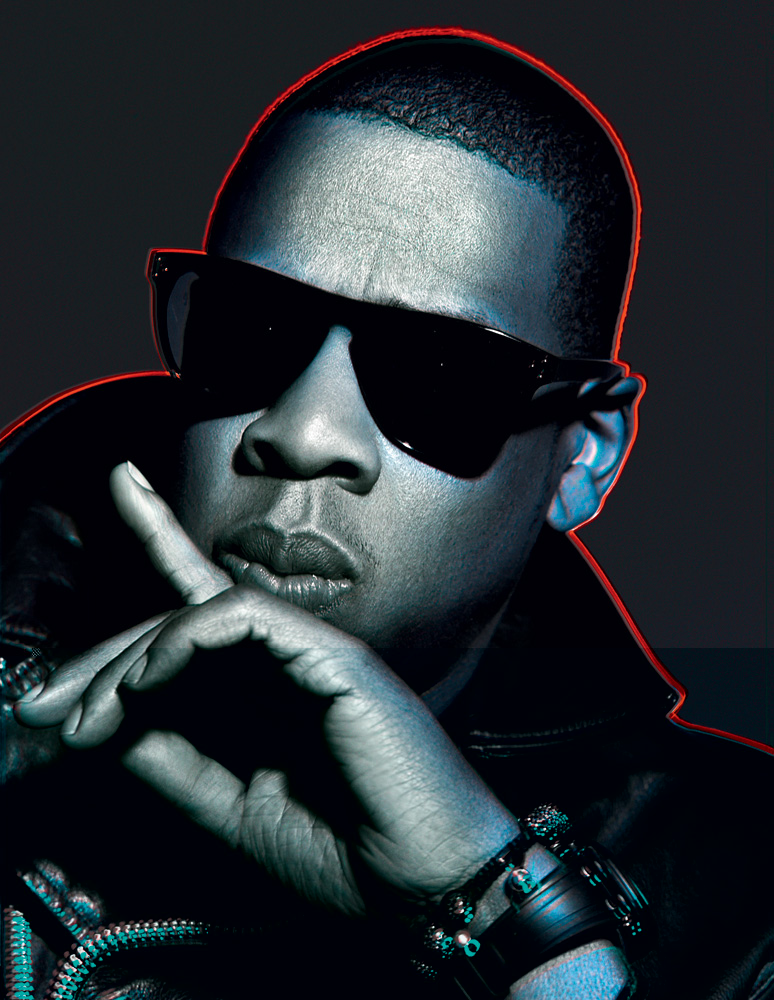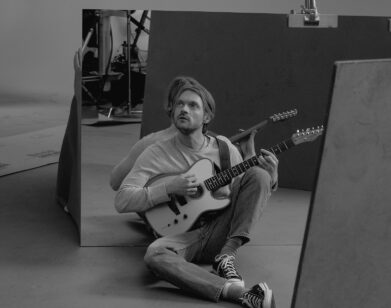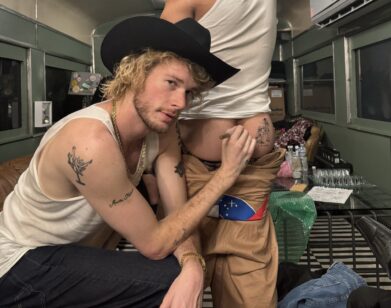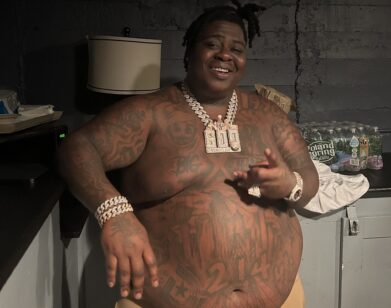Jay-Z
It would probably be a cliché to state that Shawn “Jay-Z” Carter is the opposite of the all-beef persona he proffers in song and video, but he is soft-spoken and polite. As he finishes his lunch at the Brooklyn studio where we did the photo shoot for this story, he asks for something to drink. “Snapple, I guess,” he says. “Bring me something red with that excess verbiage on the label. Although,” he laughs. “I guess that could be any of ’em.” He pays the kind of attention that’s reflected in his lyric choices.
Whenever he digressed during our conversation, he would invariably interject something along the lines of, “But let me get back to your original question . . . ” and then finish his thought—the kind of attention to detail that he brings to bear as a writer, producer, and performer with a career that, arguably, represents one of the longest running periods of sustained success in the history of hip-hop. It’s a genre that he’s seen grow from its infancy to reach a crossroads, mirroring his own evolution from his twenties to his forties. (Jay-Z turned 40 in December.) In those terms, these past couple of years have quite possibly been among the most fascinating of Jay-Z’s life: from being quoted in gesture by then-presidential candidate Barack Obama, who brushed some metaphorical “dirt” off his shoulder while giving a speech during the primaries in 2008; to signing on with Will Smith as a producer of the Broadway musical Fela!, about legendarily political Afrobeat artist Fela Kuti; to posting an old-school Zeitgeist hit such as “Empire State of Mind” in an era when video or radio play is of waning influence.
It was logical then that last fall Jay-Z dropped an album with the pressure-cooker title of The Blueprint 3 (Roc Nation), as if to remind himself that the pop world still has enormous expectations of him, yet things have indeed changed. He also possesses an acute awareness of who he is and what he has accomplished. We began the conversation talking about movies. He acknowledged Quentin Tarantino as an influence: “Man, the way Tarantino went back and forth in time, that’s it. I love Pulp Fiction (1994). I name-checked it before, but it was a big influence on my writing. If you listen to ‘Meet the Parents,’ the way he uses time as an element is big in that song.” He allows that Chuck D was right when he called rap the CNN of black America, but for Jay-Z, there’s more. “Rap for me is like making movies, telling stories, and getting the emotions of the songs through in just as deep a way. And I grew up in rap and movies the same way. I recently watched Once Upon a Time in America (1984) on a plane. Back in the day, Noodles”—played by Robert De Niro— “was my man. But when he rapes that girl, I couldn’t sit through it anymore. You come to realize that actions have consequences.” He was touching on the way movies bring us into whatever the characters are feeling at the moment. When this was pointed out, he sat back and nodded. His gift for bringing the way people talk into the way he walks in song works on both conscious and unconscious levels, a reminder that even in his music, Jay-Z has never lost sight of who—or what—he is.
For me, being with Obama or having dinner with Bill Clinton…it’s crazy. It’s mind-blowing, because where I come from is just another world. We were just ignored by politicians–by America in general.Jay-Z
ELVIS MITCHELL: Would you have ever thought there would be a time where you could have a song like “Empire State of Mind” blow up the way it has, and, yet, there aren’t any record stores around any more? Isn’t it strange that we got to this point?
JAY-Z: It’s horrible. I mean, you didn’t foresee this specifically, but you knew something would happen because whenever people reject change, things change for them anyhow. I think that’s what happened to the record business when Napster came around. The industry rejected what was happening instead of accepting it as change. Here we are today, more than a decade later, and we still haven’t figured it out.
MITCHELL: Well, it still speaks to the power of music that something like “Empire State of Mind” can pop like that. There’s still an appetite for it.
JAY-Z: Well, I don’t think the appetite is the problem. I think the consumption of music is at an all-time high. But I think the ways that record companies are trying to monetize it is just all over the place. At the end of the day, music is in the clouds. That’s where it’s at now. Before, you could hold it, look at it, turn it around. Now, it’s just in the air. That’s where it’s gonna wind up. You won’t need a shelf or a wall unit like my mom and pop had with all these big-ass records. You’ll just need your phone to call it up.
MITCHELL: I’m sorry, I’ve gotta stop you here. You must hear this all the time, but whenever you say something that’s a phrase from one of your songs . . . When you said “all-time high,” I just went right to “Numb/Encore.” Does that kind of thing happen often?
JAY-Z: All the time. It’s good. . . . It’s weird and good.
MITCHELL: I think it has to do with how you fold certain phrases into your lyrics in the way that people talk.
JAY-Z: I think it comes from me trying to tell the story in the most clear, concise, and truthful way—taking those everyday words and phrases and capturing them in a way that they become something else.
The people who write the headlines at places like the New York Post do something similar. They turn these phrases that you know into hooks. Sometimes they’re clever. Sometimes they’re stupid, like TIGER’S TALE. [laughs] Actually, that was pretty clever. Rakimsaid, “I can take a phrase that’s rarely heard/Flip it/Now it’s a daily word” [from “Follow the Leader,” off Eric B. & Rakim’s 1988 album Follow the Leader]. That’s what I’m talking about.
MITCHELL: But having that power of understanding the way people speak obviously really means something to you.
JAY-Z: I started doing it on a small level, just for the people around me. Then I realized the impact it had, the connection it created with the millions of people who’ve been through the same thing that I’ve been through, or who can relate to my ambitions or emotions . . . You don’t have to be from Marcy projects to relate to the idea of, I’m not gonna lose. I’m gonna fight, and I’m gonna make something out of nothing. You know, that’s pretty much the American dream as it stands now. So, for me, the realization that I could speak to people like that came first on a small scale. Then it just started happening—I started having this vibration.
MITCHELL: You’ve always had a really good ear for things like that in your music, but one of your real gifts is that you can hear those sorts of things in other people’s music, too—like The Notorious B.I.G. or the Neptunes or Kanye West. That’s part of what makes you a great collaborator.
JAY-Z: I just really love the music. Everyone who makes music is a good collaborator at their foundation because in order to make music, you have to connect to it in a way that other people can’t. Other things can get in the way, whether it’s the boxes that people put themselves in, or the feelings they might have towards a person. But those things don’t get in the way for me. To me, there shouldn’t be any lines. All these ways we classify things as R&B and hip-hop and rock . . . It’s bullshit. It’s all music. If you put yourself in that box, then you won’t be able to hear that it’s all music at its soul. When people say stuff like, “Oh, that’s soft rock. I don’t listen to that,” I find that elitist. It’s music-racist. [laughs]
MITCHELL: That was one of the big parts of rap for a while. Not only were you not supposed to listen to other kinds of music, you weren’t supposed to listen to other MCs either.
JAY-Z: Yeah, but that was all bravado. That was all about, “I’m the best! No one else exists!” I pretty much forget all that in terms of collaborating. I really just like breaking down those barriers, whether it means doing an album with Linkin Park, an album with R. Kelly [The Best of Both Worlds, 2002], or playing at the Brandenburg Gate with Bono.
MITCHELL: Or doing a song like “Empire State of Mind” with Alicia Keys?
JAY-Z: Exactly.
MITCHELL: If you think about all the guys in hip-hop that you came up with, you’re one of the only ones who is still here—and part of the reason is that a lot of those guys didn’t break out of that box you’re talking about. In fact, most of them are still in it.
JAY-Z: I think a big part of that is insecurity. You know, successful people have a bigger fear of failure than people who’ve never done anything because if you haven’t been successful, then you don’t know how it feels to lose it all. You don’t have that fear. So why do you think people get stuck in those boxes? It’s that fear of going back down. “I had success. I had a number one record. I had a number one album. I have to make this kind of record again or else I’m going to lose it all.” So that’s how you end up making the same song over and over. People find their zone, a place that’s comfortable, and they say, “I’m not gonna try that other thing. What if I fail? Then I’ll have to go back! What if I can’t get in the club anymore?” [both laugh] It’s difficult for me as well. The Blueprint 3 was the most difficult album that I’ve ever made.
MITCHELL: Why is that?
JAY-Z: Well, what I was trying to do with this album—which is the same thing I was trying to do on Kingdom Come [2006]—is go somewhere that hadn’t been gone before, to try to chart a new territory in rap. The reason I’ve been grounded, though, and able to make albums, is because I’ve allowed my friends to come with me and voice an opinion. That’s who keeps you grounded—the people who have known you longest. People who don’t know you, you don’t know their motives. They smile at you all day, “Oh, that’s great. You’ve done it again! You’re the greatest!” And that’s not good for an artist. You’ve gotta keep the people that have been around you, who saw you when you didn’t have anything, so they have the confidence to say, “Get out of here. That shit is bullshit!” I welcome that.
Forget about New York people—they know me. But all over the world, people talk to me like they’ve had a conversation with me before . . . Wherever I am, I don’t feel disconnected. It’s really this weird, warm feeling.Jay-Z
MITCHELL: Just calling it The Blueprint 3 really throws down a challenge to yourself, doesn’t it?
JAY-Z: Right, of course. But I thought it was needed. I think this Blueprint is even bigger than the first one [The Blueprint, 2001] in terms of rap music in general. It shows that a guy who isn’t 16 years old can make relevant music. That’s a big thing in rap because it used to be that when guys got to be 30 years old, that was it because they had to try to rap like they were 18, and then the 18-year-olds were like, “We don’t even use that slang! That’s so last week! What are you talking about? You don’t even know what’s going on out here! You’re done!”
MITCHELL: That’s when you go do a sitcom.
JAY-Z: [laughs] Yeah, exactly. Because you’re so disconnected. But if you’re a guy who loves to make rap music, then you have to do it, and those 18-year-olds are where the white-hot spot is, right? That’s what everyone says. That’s the demographic that you have to go for. But you don’t get to those kids by not being honest with yourself, because a separation develops between you and your music, and those kids don’t believe what you’re rapping about, so they don’t buy into it. That’s not something that’s honest to them. For me, the challenge is just making great albums, because talent—and writing in general—is not tangible. There’s no expiration date on it. At the same time, you might wake up tomorrow and be unable to write music. There’ve been genius artists who’ve been great for two years and then it’s gone. You just never know. So for me to put out my 11th studio album and have it connect the way it has still . . . I know it’s not Reasonable Doubt [1996]. It ain’t The Black Album [2003], either. It’s The Blueprint 3. It’s its own album, and it has connected with a lot of people.
MITCHELL: These albums are sort of like epics to you. Each song is like a scene, but there’s a context for each of them.
JAY-Z: Yeah. I mean, Blueprint 3 is made up of songs, but it’s also a commentary on the idea that in order for rap to survive, we have to stretch out the drama. We have to stretch out the audience. It can’t be this narrow—we have to stretch out the point of view. Because, as people grow, their points of view change as well, and so you start to lose people as they get older, just by nature of the fact that they don’t relate anymore to what you’re doing. Rap is fairly young, but it’s hitting this wall right now. It’s not this new thing anymore. Everyone’s heard it all before. So it’s like, “Okay, what are we going to talk about now? Where are you going to go with this?” It can’t just be about shock anymore. Before, it was all shock—“Motherfucker! Get it?” It was all this rebellious energy. Now, that’s not shocking anymore. We see the punch coming. So we’ve got to come up with something new. We gotta get on our game.
MITCHELL: Part of it, too, is that, in hip-hop, the audience generally moves from one person to the next, which is why it’s so amazing that you’ve been in the game for such a long time.
JAY-Z: Well, in rap years, I’m like The Rolling Stones or U2.
MITCHELL: The Grateful Dead.
JAY-Z: [laughs] The Grateful Dead, exactly!
MITCHELL: Were you conscious of bringing the audience along with you?
JAY-Z: Yeah, but I also never wanted to just make the same album that I made before. I am who I am as a person—I can’t change who I am.
MITCHELL: You probably don’t remember this, but we met four years ago at the Spotted Pig [the restaurant in New York City’s West Village of which Jay-Z is a co-owner]. It was the night that Bill Clinton was there. You and I were sitting outside having a cigar, actually, and you said, “Man, the world has changed. The president is talking to me about my music!” Do you remember that night?
JAY-Z: Yeah, man.
MITCHELL: I thought about that when Obama did the “dirt off my shoulder” moment. What’s it like for you to have basically two presidents who know how to deal with you?
JAY-Z: It’s unbelievable because it’s so far away from where I come from. We were the kids who were ignored by every politician. We didn’t have the numbers, the vote, to put anybody in office, because no matter who was in the office, we didn’t think that it would affect change where we lived. So nobody went out and voted. For me, being with Obama or having dinner with Bill Clinton . . . It’s crazy. It’s mind-blowing, because where I come from is just another world. We were just ignored by politicians—by America in general.
MITCHELL: But then you went from being ignored to being targeted. I mean, politicians actually went after rappers.
JAY-Z: Yeah. From being ignored, to being targeted, to being accepted.
MITCHELL: And you, as a rapper, have lived through all those eras. How has the game changed for you? You’ve changed as a person but, in a lot of ways, as you’ve grown, rap has become more of a marketing thing, and much more cynical.
JAY-Z: It’s more to deal with. Before it was just this rebellious point of view, and then money was introduced into the situation—and marketing and corporations—and then you had to figure out how to maneuver around that and to keep the music pure, while, at the same time, capitalizing off your art. I think people should get paid for their art, but there’s a way to do it. When you listen to an album, it shouldn’t feel like, “That’s the girl song,” “That’s the club song.” I shouldn’t know what you’re thinking while you’re making the song. I don’t want to know what the artist is thinking.
MITCHELL: No?
JAY-Z: No. When I listen to great music, the first thing I wonder is what people were saying when this came out of the speakers in the studio. I want to know what happened when they played it and said, “This is the one!” And then I wonder where the artist was at in their lives. Artists get hungry, or have success, or are afraid of failure, or have been cast off as finished and come back and make a great album—there are all those moments in an artist’s career. That’s intriguing to me. Like, when Lauryn Hill got pregnant, and she wrote that line “they said, Lauryn, baby, use your head/but instead I chose to use my heart” [from “To Zion” off The Miseducation of Lauryn Hill, 1998], I thought that was just such a powerful time for her. That was like a crossroads for her—like, people must have been telling her, “What are you gonna do? You’re gonna put your career in jeopardy if you have this baby.” But she just made the decision to have her kid, and she was talking about it on this record.
MITCHELL: It’s funny, though, because you’re talking about not wanting to know what the artist is thinking, yet so much of rap has been about people assuming that they already know that. Like in the days of East Coast–West Coast feuds, when you were having beefs with people . . .
JAY-Z: Yeah, but that’s on a surface level—I’m talking about something deeper than that. I never even told him this, but I remember that Eminem came into the studio when we made “Moment of Clarity,” which he produced, on The Black Album. So here’s Eminem. It’s 2003, I think The Eminem Show had come out, and he was like the biggest rapper in the world—he sold like 20 million records worldwide or some ridiculous number. But when he came to the studio, I remember I hugged him, and I could feel that he had on a bulletproof vest. I couldn’t imagine being that successful. I mean, he’s a guy who loves rap and wanted to be successful his whole career. Then he finally gets it, and there’s this dark cloud over him. There’s this big beef between 50 Cent and Ja Rule—and between real people, too—so he has to worry about that. He has to be afraid to walk around New York freely. I was like, “Here it is. You’ve gotten everything you wanted, and now you’re a prisoner of your own fame.” That’s sad to me—that you have to walk around in a bulletproof vest after you’ve sold 20 million records. So, the point being, what I’m interested in is the thing under the thing. You can think you know where he was at when he said those raps, but I saw another level of it personally, and I found it sad.
MITCHELL: So many of your songs have been about the repercussions of things—you do something, and then something else happens. Now that you’re older, do you have to think about things in a way that maybe you haven’t before?
JAY-Z: Well, when I did my first album, I was 26, so I was a little more mature than a lot of other guys—you know, to a lot of the rappers’ credit, they’re making albums when they’re 17. I can’t imagine the shit I would’ve said when I was 17. I can’t even tell you how reckless my thinking was at that age. Nas made Illmatic [1994] when he was 19, which was an incredible accomplishment—I can’t even understand it. But when my first album [Reasonable Doubt] came out, I was 26, which is why it was a little bit more introspective. Plus, I was already out on my own at 15, 16 years old. My mom didn’t put me out, but she did the best thing for me. She allowed me to search. She gave me a long leash, like, “All right. It’s tough out there. Go ahead.” So I grew up really early and I’ve always been aware of these things. My awareness of them just intensifies with every year.
MITCHELL: What’s it like when you talk to Kanye West now? How are things different between you guys from what they werelike when you first spotted him and he was producing for you?
JAY-Z: Well, he’s really more of a peer now. You know, before, he was more a new guy trying to get on—a fan of the music that I’ve made and my lifestyle—so things were a little different. But he’s an extraordinary person. He has these ideas and these things that he wants to do and places he wants to go, and he’s really passionate about them. He’s very sincere.
MITCHELL: Sometimes his passions ruin him.
JAY-Z: Yeah, which is great. I like that, man! I really do. I mean, no one’s walking around here perfect. Everyone’s gonna make mistakes. That’s part of how you learn. I think Kanye . . . Well, I know he said what he believed. He was telling the truth.
MITCHELL: To which event are you referring?
JAY-Z: I’m talking about the Taylor Swift thing. I just think the timing of what he did was wrong, and that, of course, overshadowed everything. He believed that “Single Ladies” [by Jay-Z’s wife, Beyoncé] was a better video. I believed that. I think a lot of people believed that. You can’t give someone Video of the Year if they don’t win Best Female Video. I thought Best Female Video was something you won on the way to Video of the Year. But, hey, I guess it wasn’t—and that’s a whole other conversation about awards shows and artists.
MITCHELL: You seem to stay away from that awards show stuff for the most part.
JAY-Z: Yeah, because it ain’t about nothing. It’s cool. It’s acknowledgment. The fans get to see you, and you can do great by your record if you have a great performance or a great night there. That’s all part of the business. But at their core, awards shows are not really a sincere thing. You know, for a lot of years, the artists had to pay to play their own set.
MITCHELL: No kidding!
JAY-Z: Yes. That was the worst scam ever. I couldn’t even believe it. I mean, just now they’re starting to pay for half the sets and some awards shows pay for the whole thing. But this is just happening now—and it’s only because the record companies ran out of money.
MITCHELL: You’ve always had interesting takes on awards shows. I remember back in the day, you talked about the Grammys and said, “Well, they don’t take rap seriously, so why should I go? They don’t know what we do—and they don’t care about what we do.”
JAY-Z: It’s just honest, man—they really didn’t. I’ve always seen awards shows for what they are. For the awards show people, it’s about sponsorships—it’s not about recognizing anyone’s art, because if you get into the business of recognizing art, then you have to get it right all the time. You have to get it right. You can’t have the woman who wins Video of the Year not win Best Female Video. I mean, Herbie Hancock is great, but you can’t have him beat the Kanye album that year. I mean, come on, seriously. That can’t happen. That just lets me know that the people who get to pick these ballots just check the only name they know. I think that’s what’s happening with rap music now.
MITCHELL: Yeah?
JAY-Z: I think it’s a bunch of people who don’t know anything about rap, and have probably never even heard a Kanye West album, are doing the nominating, and they say, “Kanye West. I know that name. That’s the guy who made the comments about the president that time! He’s nominated!” That’s how the process works, and I think that’s part of Kanye’s frustration. Me, I look at it for what it is. But Kanye is so passionate about it. I mean, the guy shot three “Jesus Walks” videos. Three. Two of them he shot with his own money just so he could get it right. He really cares about it. And then, back to the original point, his passion kicks in and he takes things too far . . . He doesn’t realize that that girl, Taylor Swift, is just like him. That was her moment. It wasn’t her fault. She didn’t do anything. It’s not her awards show. So he just did the wrong thing to the wrong person at the wrong time.
MITCHELL: Did he call you that night? Did you guys talk about what happened right away?
JAY-Z: We actually had to fly out because we were doing Leno the next day, and he called and said he wasn’t getting on the plane. I knew he didn’t want to have the conversation yet. It’s more of a big brother relationship with me and him. But he came the next day, and we spoke in the dressing room. We had a nice, long talk. I think he did the right thing to face it and just move on. I say this all the time, but I think, at the end of the day, we’re gonna celebrate him for his passion more than vilify him.
This is an excerpt of the February cover story. To read the full Jay-Z interview pick up a copy of Interview.







